Use 'Print preview' to check the number of pages and printer settings.
Print functionality varies between browsers.
Printable page generated Wednesday, 4 February 2026, 10:34 AM
Health Management, Ethics and Research Module: 2. Management and Leadership in Community Healthcare
Study Session 2 Management and Leadership in Community Healthcare
Introduction
As a Health Extension Practitioner you may not think of yourself as a manager or a leader, but good management and leadership is a key part of any organisation’s success, including all levels of the health service. You will be expected to play a leading role in managing health resources efficiently and effectively in your local community.
In order to manage the work, people and operation of local health services, Health Extension Practitioners should be equipped with the knowledge, skills and competencies of management and leadership. Knowing key concepts and functions, such as planning, implementation, monitoring and controlling, will be necessary when dealing with the health of your community and all the individuals within it. You will be a leader when it comes to achieving Primary Health Care goals.
In this study session you will be introduced to the key concepts of management and leadership, the levels and roles of management, and the types of leadership that are most important for your healthcare work in the community.
Learning Outcomes for Study Session 2
When you have studied this session, you should be able to:
2.1 Define and use correctly all of the key words printed in bold. (SAQ 2.1)
2.2 Briefly describe the main principles of healthcare management. (SAQ 2.2)
2.3 Explain the roles and levels of management in healthcare work and why healthcare management is important for your work as a Health Extension Practitioner. (SAQ 2.3)
2.4 Describe leadership concepts in community healthcare and understand the differences between management and leadership. (SAQ 2.4)
2.1 What is management?
You may have wondered what management actually is. Management is quite simply getting things done through people. As a Health Extension Practitioner at community level, your job will involve management because it will help you achieve your intended goals. Using management techniques will help show you how to make changes to improve the health of everyone in your community. When you start your job you may ask yourself, ‘What am I supposed to do now?’, and you may seek inspiration from people who have written about management. For example Henri Fayol, a French theorist who lived from 1881 to 1925, was one of the first to tackle the question ‘What is management?’ (Box 2.1).
Box 2.1 What is management?
Management is the process of forecasting and planning, organising, leading, coordinating and controlling the resources of an organisation in the efficient and effective pursuit of a specified organisational goal.
Look at the definition in Box 2.1. Although it was written many years ago do you think that it might still apply today?
This definition has stood the test of time. It’s as good as any more recent definition.
Healthcare management theory evolves out of more general theories of management that govern the effective use of human and material resources, and applies them in a healthcare setting. Your key goal in community health management is improving the health of your community. Reaching this goal requires an understanding of the concepts of management and leadership.
2.2 Concepts of management
Three of the most important concepts in healthcare management are effectiveness, efficiency and equity. In this section you will learn more about these concepts to help you work successfully with people and resources.
2.2.1 Effectiveness
The concept of effectiveness is a measure of how well an organisation, or a person in an organisation, is meeting their goals. For example, if the goal is to provide high quality healthcare and the organisation or person succeeds in doing so, then they are working effectively. If the healthcare provision is poor and people are not satisfied, then the organisation or person is not effective.
The health sector becomes effective when health managers choose the correct goals and then make sure that their health teams can achieve them. Health manager effectiveness involves doing the right things to move the health sector closer to its objectives and at the same time continually learning from that experience. Monitoring and control helps you to measure performance against set objectives and standards and thus assess effectiveness and how well an objective has been achieved. You will learn more about monitoring and control in Study Session 5.
A Health Extension Practitioner is set an objective to distribute 500 malaria bed nets during one year and succeeds in distributing 100 (Figure 2.1). What do you think went wrong?
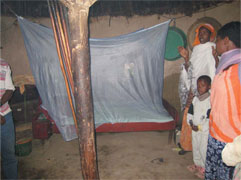 Figure 2.1 Healthworker distributing bed nets to a rural family. (Photo: FMOH/WT)
Figure 2.1 Healthworker distributing bed nets to a rural family. (Photo: FMOH/WT)There may be many reasons why the objective has not been reached, but this is a failure of management. The Health Extension Practitioner has not been managed effectively, or she would have achieved her objectives.
2.2.2 Efficiency
Healthcare management involves getting things done using human, financial and material resources so that the goal of improving the health of the community can be achieved. Efficiency is a measure of how well the health sector is using its resources to achieve that goal. If money and materials are being used well and there is little wastage, then you are working efficiently. If costs are too high or materials are being wasted, then your activity is inefficient. Efficiency involves doing things right, using resources wisely and with a minimum of waste.
Health Post A has received an anti-malarial drug with only one month’s shelf life remaining. It expires after one month having served only a few people. Is this an efficient use of resources?
No. In this case there is a waste of resources.
2.2.3 Equity
Access to healthcare is the basic right of all people. However, this does not always happen in real life for many reasons. Health inequalities are a result of the unfair distribution of resources and may be associated with low income levels, housing, education, gender, geographically inaccessible areas and sometimes with ethnicity. As a Health Extension Practitioner you have an important role to play in allocating resources equally to all the diversified groups in your community, with a special focus on those who are deprived and denied access to healthcare.
2.3 Principles of management
For Health Extension Practitioners the following principles are the most important for you to apply in the field of community health:
- Team spirit
- Division of labour
- Focus on results not activities
2.3.1 Team spirit
Team spirit is essential for any organisational work. This principle advocates the benefits of working as a team and building good morale amongst everyone you work with, including volunteers and members of model households. As a manager you will need to ensure that you develop and maintain morale, both individually and communally, and through building team spirit. This helps promote an atmosphere of mutual trust and understanding.
2.3.2 Division of labour
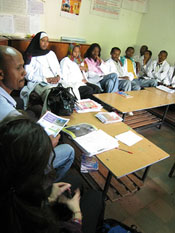
The principle of division of labour is that work must be shared or divided fairly amongst the team. Normally, in a team, there needs to be division of labour, where each category of staff exercises their particular skill towards achieving specific objectives (Figure 2.2). The role of management is to assign a balanced proportion of each type of worker to the work to be done.
There has been an outbreak of diarrhoeal disease in your community. A prevention and control committee has formed in response to the epidemic and identified a number of activities which will be needed to sort out the problem. The work (a–d) must be divided amongst the staff and groups available (1–4), who all have different skills. Who will do which activity? Match (a–d) with (1–4).
(a) Mobilising the community (1) Water committee (b) Check medicine supplies (2) Kebele administration (c) Ensure water is treated and safe (3) Health Extension Worker/Practitioner (d) Give health education and advocacy (4) Health personnel You should have:
- a.The kebele administration and the Health Extension Worker/Practitioners must mobilise the community.
- b.Health personnel must assure the supply of medicine.
- c.The water committee should ensure that the water is treated and safe.
- d.The Health Extension Worker/Practitioner should give health education and advocacy.
2.3.3 Focus on results not activities
One of the principles of management is to make sure that everybody within the organisation has a clear understanding of the goals and objectives, and makes each person aware of their own roles and responsibilities in achieving those objectives. This is commonly called management by objective, which is a systematic and organised approach that allows management to focus on achievable goals (Figure 2.3). Deciding and saying what is to be accomplished is setting an objective (a goal, a purpose or a target). There are many kinds of objectives. For example, you may have an objective that 80% of the pregnant women in your kebele will attend antenatal care and be delivered by Health Extension Practitioners next year.
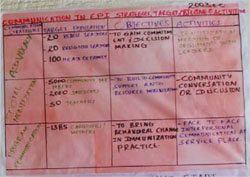
2.4 Management functions
From the definition in Box 2.1 you have learnt that management is a process that can be divided into five distinct parts involving interrelated activities. Health Extension Practitioners play various roles in the Primary Health Care system. You will be expected to be a manager, leader, coordinator, planner, supervisor and also monitor of the health services in your community. Management consists of the following functions.
2.4.1 Planning
Planning is forecasting and thinking about things that you want to happen in the future and then working out ways to get there. It will be your job to help develop the plans that determine the goals you pursue to improve the health of all the people in your community. As a first step you need to prepare plans for the future and this is best done together with community groups that share a common purpose.
2.4.2 Organising
After a plan is developed it needs to be translated into action. As part of the implementation process, organising the various administrative structures and community group members is crucial. Furthermore, you need to construct a set of formal relationships with different groups in the community (Figure 2.4). This process will help you in deciding how the plan will be carried out and who will do it.
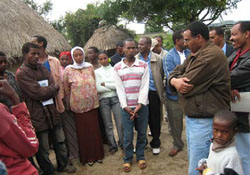
2.4.3 Leading
Leading is directing, influencing and motivating a team. At the community level, the health delivery system includes various community groups, such as model households, volunteers and development workers. As a Health Extension Practitioner you are a leader and you will play a leading role in working with these groups, to carry out the different activities involved in maintaining community health. You need also to create an environment that encourages your teams to do their best work so their performance inspires other members of the community.
2.4.4 Coordination
To coordinate activities is to ensure that everything that needs to be done is done and that no two people are trying to do the same job. Coordination will help you to see whether the things that you and your team are doing are consistent with your overall plan. You may arrange meetings with your team as a coordination mechanism to discuss how jobs and responsibilities are progressing.
2.4.5 Monitoring and control
Monitoring and control will be an important part of your role as a Health Extension Practitioner, otherwise you won’t know how well you are doing as you try to achieve your goals and objectives (Figure 2.5). Monitoring is the regular observation and recording of activities. Controlling is ensuring that work has been accomplished according to plan. If your monitoring and control activities indicate that you aren’t being very effective then you may have to change the way that you are working or ask for extra help from your supervisors.
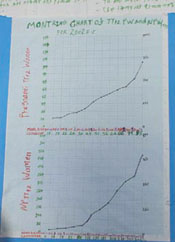
Look again at the list of management functions. Imagine that you are trying to increase the number of people in your community who use latrines regularly. Which of the management functions do you think is the most important?
All these functions are important when you try to achieve your health objectives. Good management involves the use of all these functions.
2.5 Management roles and levels
A health manager is someone who spends a substantial proportion of their time managing areas of healthcare provision such as:
- coverage of services (planning, implementation and evaluation)
- resources (staff, budgets, drugs, equipment, buildings, information)
- external relations with partners, including service users.
A manager’s effectiveness is significantly influenced by their insight into their own work. Health sector managers often become managers after working in a technical role within healthcare. Indeed, many healthworkers combine management with clinical or other technical work.
2.5.1 Management levels
In healthcare management there are three levels of managers: top, middle, and frontline. Together they are responsible for the work and performance of the health sector. These managers have formal authority to use health sector resources and to make decisions appropriate to their level.
Top-level managers
Top-level managers are often called senior management or executives. In Ethiopia, the Federal Ministry of Health and Regional Health Bureau include top-level managers and they hold titles such as Minister, Head of Regional Health Bureau, and Director. Often, a group of these managers will constitute the top management team. Top-level managers make decisions affecting the entirety of the health sector. Top managers do not direct the day-to-day activities of the sector; rather, they set goals for the health sector and direct others to achieve them.
Middle-level managers
Middle-level managers are those in the levels below top managers. Middle-level managers are responsible for carrying out the goals set by top management. They also set goals at their level and perhaps for other units they are responsible for. Middle-level managers can motivate and assist frontline managers to achieve the sector objectives. They may also communicate upwards, by offering suggestions and feedback to top managers.
Frontline managers
First-level or frontline managers are responsible for the daily management of health activities in the community. Health Extension Practitioners, for example, are frontline managers of the primary healthcare services. Although lower-level managers typically do not set goals for the nation, they have a very strong influence on the sector and do have to set goals for their own work. These are the managers that interact most with the larger community on a daily basis.
What level of management is each of these: Health Extension Worker, Health Centre Director, Health Extension Practitioner, Minister of Health, Health Volunteer, Head of Regional Health Bureau?
Health Extension Practitioners and Workers are frontline managers. The Head of the Regional Health Bureau and the Minister of Health are top-level managers. The Health Centre Director is middle-level. Although Health Volunteers don’t have a formal management role they still do important work within the health service and may have to help organise what actually happens in your community.
2.5.2 What do managers do?
So, what do health managers actually do? Managers play various roles in their day-to-day activities which are generally categorised as interpersonal roles, informational roles and decisional roles. As a Health Extension Practitioner, who is also a frontline manager, you will have a role to play at community level. The different roles are briefly described as follows.
Interpersonal roles
Working together with other people in your team is sometimes the most rewarding part of the job, but it does require skill. Interpersonal roles require you to direct, support and supervise your team, and work together with people from other agencies. This role is particularly critical for Health Extension Practitioners, who must often compete with other managers (in agriculture) for important resources, yet also maintain successful working relationships with them. Interpersonal roles are categorised as the leader role, figurehead role and liaison role.
The leader role involves all the leadership and motivational activities that are essential for the effective management of people. The people that will expect you to fulfill a role as leader include model householders and the health volunteers. A leader acts as an example for other team members to follow. You may have to give directions to those who you are working with, make decisions, and mobilise community support.
The figurehead role deals largely with ceremonial and symbolic activities such as attending opening ceremonies or taking a special part in community celebrations (Figure 2.6). The figurehead may be a top or middle manager at Federal level. At village level, however, frontline managers such as Health Extension Practitioners also play a figurehead role within the community.
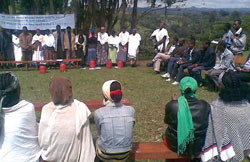
The third type of interpersonal role is a liaison role which includes those activities which you as a Health Extension Practitioner need to undertake in order to develop and maintain a network of contacts inside and outside the community. For example, maintaining contact and good relationships with District Health Offices and Health Centres is always important. In your liaison role, you will need to coordinate the work of others in different sub-kebeles; establishing alliances between other sectors, such as agriculture, education, and working together to share resources.
You are asked to give out the certificates to the health volunteers who have completed their training. What role is this?
Attending ceremonies in your own community and having a formal role is a figurehead role. People in your community will look up to you and expect you to support and encourage them when they work to improve the health of the community.
Informational roles
Informational roles are those in which you gather and then pass on information. These roles have changed dramatically as technology has improved. These roles mainly involve the movement of information. As a Health Extension Practitioner, you are placed in a strategic position to obtain and disseminate critical information about health promotion and disease prevention. Under the informational role you play a monitor, disseminator and spokesperson role.
Your role as a monitor deals with the search for and collection of information that is of value to the health of your community.
The disseminator role entails passing on relevant information to those in the community that have a need to know. The dissemination process may be written or oral, formal or informal.
The third type of informational role that you may play is in the spokesperson role, which involves the dissemination of information to others outside the community.
Imagine that there is an outbreak of diarrhoeal disease in your community. What informational roles do you think it would be important for a Health Extension Practitioner to perform?
They should monitor information about the outbreak and find out as much as possible about how to deal with the outbreak. They also need to disseminate information so that everyone knows how to deal with it. They may also have to be a spokesperson and seek additional resources so that the outbreak is contained and further outbreaks possibly prevented in the future.
Decisional roles
Decisional roles include the roles of: resources allocator, negotiator, entrepreneur and disturbance handler. It is important to recognise that these roles are highly interrelated, as suggested in Figure 2.7.
The resource allocator role entails the prioritisation and allocation of scarce resources in response to the many demands on those resources. The negotiator role is to negotiate resolutions to important disputes, both inside and outside the community. The entrepreneur role is to seek and identify opportunities to promote improvement and needed change. The entrepreneur role requires you to assign community resources to develop innovative services.
The disturbance handler role involves taking corrective action when needed to resolve unexpected disturbances. In this role, the health manager must handle problems and conflict among team members.
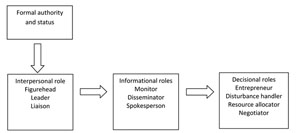
Look again at Figure 2.7. Imagine that there is an outbreak of an infectious disease in your community. Which role or roles do you think that the Health Extension Practitioner would have to take on?
In many instances the Health Extension Practitioner might be engaged in several different roles at the same time. If there is an outbreak of an infectious disease they would have to take on almost all these roles.
2.6 What is leadership?
Leadership is concerned with influencing the thoughts, attitudes and behaviours of other people. Each Health Extension Practitioner is a leader of Primary Health Care in their village and will set a direction for the community; you help the community see what lies ahead; you help them visualise what they might achieve; you encourage them and inspire all the community members. Leadership is the ability to get other people to do something significant that they might not otherwise do.
To carry out their roles effectively, leaders need a combination of characteristics including: intelligence, initiative, self-confidence and the ‘helicopter trait’, which is the ability to rise above immediate events and try to work out longer term or strategic ways forward.
2.6.1 Leadership functions
As a health manager you have three main leadership functions within your group or community:
Strategic function: To develop a sense of direction in the group or community. You must provide a mission (what needs to be done) and a strategy (a path for how to accomplish the mission and a way for the group to get there). But developing a clear vision and a careful strategy is not enough, you must also clearly communicate them to your community.
Tactical function: This involves identifying and choosing the most appropriate means to persuade the group or community.
Interpersonal function: It is important to maintain the morale, cohesion and commitment of the group or community.
What do you consider are the main differences between a manager and a leader?
The main aim of a manager is to maximise the output of an organisation through a formal, rational method. The main aim of a leader is to motivate others to bring about change.
Summary of Study Session 2
In Study Session 2, you have learned that:
- Management is getting things done through people.
- The most important concepts of management are effectiveness, efficiency and equity. Effectiveness is a measure of the appropriateness of the goals chosen. Efficiency involves doing things correctly using resources wisely and with a minimum of waste. Management principles include: team spirit, division of labour and a focus on results.
- Management has five main functions: planning, organising, leading, coordinating and control.
- In healthcare management there are three managerial levels: top-level, middle-level and frontline managers. The three roles of health managers are interpersonal, informational and decisional.
- Management deals with planning, budgeting, organising and staffing, controlling, and problem solving, in order to achieve results. Leadership is establishing direction, aligning people, and motivating and inspiring them in order to bring about change.
Self-Assessment Questions (SAQs) for Study Session 2
Now that you have completed this study session, you can assess how well you have achieved its Learning Outcomes by answering the following questions. Write your answers in your Study Diary and discuss them with your Tutor at the next Study Support Meeting. You can check your answers with the Notes on the Self-Assessment Questions at the end of this Module.
SAQ 2.1 (tests Learning Outcome 2.1)
Fit the following words (A–D) into their correct sentences (1–4):
A Management
B Leadership
C Health manager
D Controlling
- The … enjoyed helping the rest of her team to achieve their goals and objectives.
- … expenditure on the health campaign became difficult because of the rising costs.
- Every healthworker can demonstrate their … qualities and become an important part of the team.
- Although most Health Extension Practitioners enjoy looking after people in their community they also need to develop their …. skills so that the health of everyone in their community can be improved.
Answer
- The Health Manager enjoyed helping the rest of her team to achieve their goals and objectives.
- Controlling expenditure on the health campaign became difficult because of rising costs.
- Every healthworker can demonstrate their Leadership qualities and become an important part of the team.
- Although most Health Extension Practitioners enjoy looking after people in their community they also need to develop their Management skills so that the health of everyone in their community can be improved.
SAQ 2.2 (tests Learning Outcome 2.2)
What are the main principles of healthcare management?
Answer
The main principles of healthcare management are usually considered to be maintaining team spirit, ensuring the correct division of labour and focusing on the results of the team’s activities. All these principles can be achieved by planning, organising and coordinating, and by skillfully leading your team. Monitoring and control is always important to make sure that your health objectives are being achieved.
SAQ 2.3 (tests Learning Outcome 2.3)
What are the main levels of managers in the healthcare system? What level of management do Health Extension Practitioners fit into and why is their management role important?
Answer
The main levels of managers in the healthcare system are usually considered to be top-level managers, middle-level managers and frontline managers. Health Extension Practitioners are, of course, frontline managers. Their management tasks are concerned with the practical provision of health services to their community. In many ways this is the most important level and requires a lot of skill to make sure that the correct resources are used to tackle disease and ill health in your community.
SAQ 2.4 (tests Learning Outcome 2.4)
Describe leadership and its principles. How does it differ from management?
Answer
Leadership is one of the ways that Health Extension Practitioners can influence the health of people in their community. Using their leadership role, Health Extension Practitioners can show villagers the correct ways to maintain their health and influence the ways that they think about protecting themselves and their families. A good leader will make sure that the correct decisions about health are taken by the members of their community. Leadership is a less precise feature of the work of Health Extension Practitioners than management. Leadership will rely on motivation to help people change, rather than direct or formal organisation of health activities that relies on the management of resources.